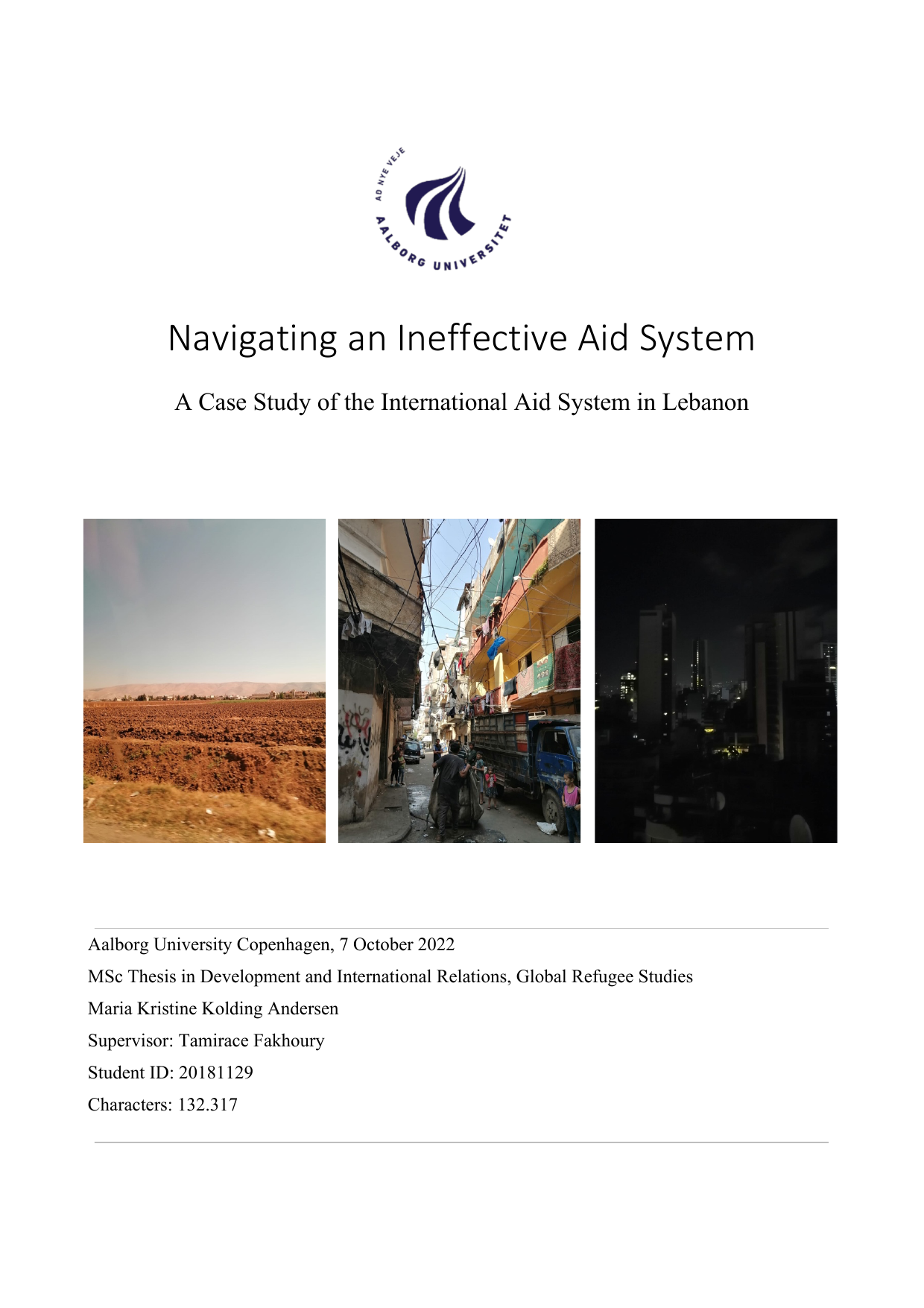
Navigating an Ineffecient Aid System: A Case Study of the International Aid System in Lebanon: A Case Study of the International Aid System in Lebanon
Term
4. term
Education
Publication year
2022
Submitted on
2022-10-07
Pages
55
Abstract
This thesis investigates how Lebanese NGOs perceive and interact with the international aid system in Lebanon in the context of the displacement of 1,5 million Syrian refugees and compounding crises - the economic and financial crisis, COVID-19, and the Beirut Port Explosion in 2020. As the international aid system in Lebanon is struggling with addressing the increasing needs of the population, the research at hand aims to contribute to the discussion on how the aid system can be improved by highlighting its insufficiencies. Therefore, this thesis examines, through the theoretical frameworks of critical humanitarianism and subversive humanitarianism, the consequences, and inconsistencies within the aid system, the crises’ impact on the aid system, and what options local NGOs have to navigate, impact and interact with the system. By including local NGOs’ perspectives, this thesis attempts to advance the understanding of the aid system and its challenges, and how it can be improved, from an often neglected, but important position. The research relies on a theory-guided case study of the aid system combined with a document analysis of relevant material. Expert interviews were conducted with eight Lebanese NGOs and one multi-national donor organization operating in Lebanon. The analysis argues that local NGOs, on one hand, have found ways to influence and navigate the aid system on their own terms, and in doing so, at times challenge the Northern-led agenda on aid. On the other hand, the current international aid system in Lebanon has become fragmented and overwhelming for humanitarian actors and is preventing local NGOs from working efficiently and developing themselves. These tendencies are exacerbated by the current crises and ultimately have consequences for; the overall provision of aid, which is lacking a coherent, strategic response and prospects for long-term sustainable solutions; and for the asymmetric power relations between international and local actors operating within the aid system. Keywords: Lebanon, critical humanitarianism, subversive humanitarianism, The Grand Bargain, localization, humanitarian aid, development aid, the international aid system, local actors.
This thesis investigates how Lebanese NGOs perceive and interact with the international aid system in Lebanon in the context of the displacement of 1,5 million Syrian refugees and compounding crises - the economic and financial crisis, COVID-19, and the Beirut Port Explosion in 2020. As the international aid system in Lebanon is struggling with addressing the increasing needs of the population, the research at hand aims to contribute to the discussion on how the aid system can be improved by highlighting its insufficiencies. Therefore, this thesis examines, through the theoretical frameworks of critical humanitarianism and subversive humanitarianism, the consequences, and inconsistencies within the aid system, the crises’ impact on the aid system, and what options local NGOs have to navigate, impact and interact with the system. By including local NGOs’ perspectives, this thesis attempts to advance the understanding of the aid system and its challenges, and how it can be improved, from an often neglected, but important position. The research relies on a theory-guided case study of the aid system combined with a document analysis of relevant material. Expert interviews were conducted with eight Lebanese NGOs and one multi-national donor organization operating in Lebanon. The analysis argues that local NGOs, on one hand, have found ways to influence and navigate the aid system on their own terms, and in doing so, at times challenge the Northern-led agenda on aid. On the other hand, the current international aid system in Lebanon has become fragmented and overwhelming for humanitarian actors and is preventing local NGOs from working efficiently and developing themselves. These tendencies are exacerbated by the current crises and ultimately have consequences for; the overall provision of aid, which is lacking a coherent, strategic response and prospects for long-term sustainable solutions; and for the asymmetric power relations between international and local actors operating within the aid system. Keywords: Lebanon, critical humanitarianism, subversive humanitarianism, The Grand Bargain, localization, humanitarian aid, development aid, the international aid system, local actors.
Keywords
Documents
